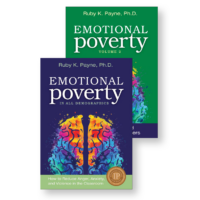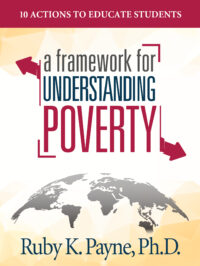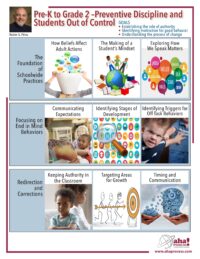
As I travel the country, I’m often asked, What is the best thing about _______________? The blank is usually about one of the aha! Process books or workshops. Occasionally, it is about the best location I’ve visited. Rarely, it is about the best airport I’ve seen.
With that in mind, let me give you what I think are the best things about aha! Process workshops.
The Emotional Poverty training addresses some myt hs about behaviors and offers a solid foundation in causes and optional responses to misbehavior. It helps educators see past someone’s actions with an increased focus on the creation of certain behaviors or beliefs behind behavioral patterns. It provides strategies for both immediate and long-term effects. It also gives educators a better sense of purpose with what to do when addressing misbehaviors.
hs about behaviors and offers a solid foundation in causes and optional responses to misbehavior. It helps educators see past someone’s actions with an increased focus on the creation of certain behaviors or beliefs behind behavioral patterns. It provides strategies for both immediate and long-term effects. It also gives educators a better sense of purpose with what to do when addressing misbehaviors.
A Framework for Understanding Poverty
 Framework has always impressed me as a unique approach to economic differences that is still easily overlooked. Most of us live in such a narrow bandwidth of experiences that defaulting to judgment and criticism of the unfamiliar is the only logical reaction. Framework removes the judgments between poverty, middle class, and wealth, and it allows participants to better understand their position in empowering their students with knowledge and a solid education.
Framework has always impressed me as a unique approach to economic differences that is still easily overlooked. Most of us live in such a narrow bandwidth of experiences that defaulting to judgment and criticism of the unfamiliar is the only logical reaction. Framework removes the judgments between poverty, middle class, and wealth, and it allows participants to better understand their position in empowering their students with knowledge and a solid education.
There are many things that beginning teachers are not told about our profession in education. The first few years normally feel like baptism by fire. It is much harder to negotiate, self-advocate, and persevere when you’re missing core pieces of information. Even veteran educators overlook some of the simple techniques and strategies presented in this training. Before You Quit Teaching helps put order to chaos and clearly communicates realities in education that are seldom discussed.
told about our profession in education. The first few years normally feel like baptism by fire. It is much harder to negotiate, self-advocate, and persevere when you’re missing core pieces of information. Even veteran educators overlook some of the simple techniques and strategies presented in this training. Before You Quit Teaching helps put order to chaos and clearly communicates realities in education that are seldom discussed.
When it comes to genders, there are myths and there are realities. Too many times, myths take center stage in everyday discussions. The Boys in Crisis workshop puts research at the forefront of the conversation and promotes a forum where it is safe to discuss and analyze many misconceptions. There are solid reasons why boys have higher dropout rates, a higher number of suspensions, a higher representation in special education, and a much higher incarceration rate in comparison to women. These realities need to be discussed openly to work with them efficiently.
Pre–K to Grade 2—Preventive Discipline and Students Out of Control
 When educators are working with four- to seven-year-old students, they are faced with the harsh reality that this age group is often highly impulsive and not well established in its ability to express themselves. Nonverbal communication is sometimes more critical than verbal for these ages. Teachers must be very specific because this age group is extremely literal. This workshop helps teachers acquire strategies and understanding to help communicate and teach with greater efficiency. It also empowers teachers to recognize an increased number of issues for which they can take control.
When educators are working with four- to seven-year-old students, they are faced with the harsh reality that this age group is often highly impulsive and not well established in its ability to express themselves. Nonverbal communication is sometimes more critical than verbal for these ages. Teachers must be very specific because this age group is extremely literal. This workshop helps teachers acquire strategies and understanding to help communicate and teach with greater efficiency. It also empowers teachers to recognize an increased number of issues for which they can take control.
Please share with me your best of the best by dropping me a note.








